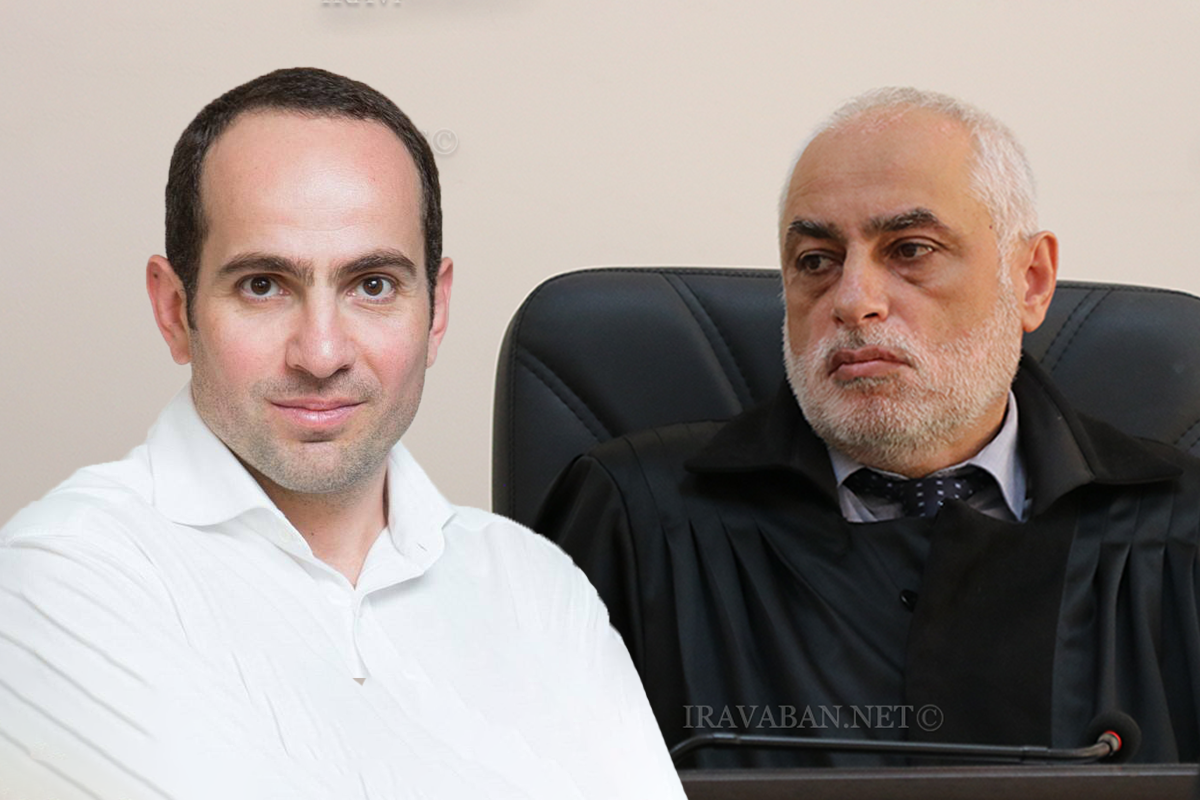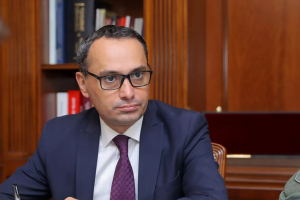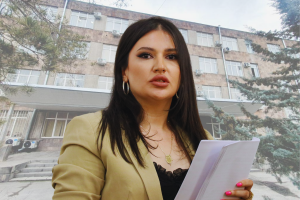The court hearing on the confiscation of allegedly illicitly acquired property belonging to Sedrak Kocharyan, the eldest son of Armenia’s second President Robert Kocharyan, and his wife Zaruhi Badalyan took place today, February 6, at the Anti-Corruption Civil Court. The hearing is presided over by Judge Karapet Badalyan.
According to Iravaban.net, during this session, Mary Safaryan, the representative of a third party involved in the case, submitted a motion to postpone the trial, stating that she was occupied with another criminal hearing at the anti-corruption court.
The respondent’s representatives joined the submitted motion. Gevorg Kocharyan, senior prosecutor of the Department for Cases of Confiscation of Illicitly Acquired Property, said it would be expedient to continue the session, considering that the main parties to the case were present.
It should be noted that prosecutors Hamlet Harutyunyan and Artashes Harutyunyan from the Department for Cases of Confiscation of Illicitly Acquired Property were involved in this hearing.
The court rejected the submitted motion, considering the third party representative’s absence unjustified, and noted that today’s preliminary court session had been previously agreed upon.
The session continued, and the respondent’s representative, lawyer Arthur Hovhannisyan, submitted a motion to apply expedited proceedings and reject the presented claim as “obviously” unfounded. In the motion, the responding party stated that at this stage, the court has the right to apply expedited proceedings if the claim is “obviously” unfounded, if the formulated claim is clearly illegitimate and subject to rejection regardless of the existing facts.
According to the lawyer, it should be rejected because it was filed by an improper plaintiff against improper defendants.
He addressed the procedural parties of plaintiff-defendant, their status, and issues related to having conflicting interests.
In the motion, the respondent’s representative examined whether, within the scope of constitutional powers, the plaintiff could participate in proceedings for the confiscation of illicitly acquired property, and whether Sedrak Kocharyan and Zaruhi Badalyan could act as defendants in this case.
“The filing of the claim in this case does not stem from the prosecutor’s office’s authority. Consequently, the prosecutor’s office cannot act as a proper plaintiff,” said Hovhannisyan, citing Article 176 of the Constitution, which specifies the powers granted to the prosecutor’s office.
He noted that the prosecutor’s office, in the submitted claim, insisted that the expenses were made using Robert Kocharyan’s funds, meaning the latter was the real beneficiary of the property, and the related persons – Sedrak Kocharyan and Zaruhi Badalyan – are improper defendants regarding this claim.
“In this case, the claim against Sedrak Kocharyan and Zaruhi Badalyan was filed as persons connected to Robert Kocharyan, moreover, the presented demands relate to confiscating their legal or receivable property, whereas under conditions where Robert Kocharyan is considered the real beneficiary of the property, the legal property belonging to Sedrak Kocharyan and Zaruhi Badalyan cannot in any case be evaluated as property subject to confiscation,” he said.
As he has repeatedly stated his position on this issue in other sessions, Gevorg Kocharyan emphasized during the discussion of this motion that the prosecutor’s office carries out protection of state interests in such civil cases.
He said that this concerns income not justified by legal earnings, and the fact that they are not justified by legal income does not imply that damage has been caused to the Republic of Armenia.
“The scope of powers, naturally, could not have been fully defined by the Constitution. In this case, we have a separate law ‘On Confiscation of Illicitly Acquired Property,’ which provides separate regulations, stating that in the absence of corresponding regulations, one should be guided by civil procedure and other laws,” the prosecutor stated.
Kocharyan said that the “Law on Prosecutor’s Office” defines the powers and obligations with which the plaintiff is vested. Regarding the position raised about the improper defendant, he stated that under the law, both property belonging to a person by right of ownership and property belonging to a person acting as real beneficiary are equally on the same plane.
Hamlet Harutyunyan, another representative of the plaintiff, noted regarding the motion that the regulation of relations for filing a claim for protection of state interests is left to the legislator, and the latter has provided in the “Law on Prosecutor’s Office” in which cases the prosecutor’s office can file a claim for protection of state interests.
Lawyer Aram Vardevanyan, before expressing his position, asked Arthur Hovhannisyan whether the motion simultaneously cites that there is both an improper plaintiff and defendant and absence of legal interest, or if in all cases the emphasis is that there is an improper plaintiff and improper defendant. Hovhannisyan said that if a party has no legal interest, the person submitting such a claim is considered an improper plaintiff.
The next question concerned whether in all cases the interpretation regarding the improper plaintiff stems from being outside the scope of authority provided by the constituent in Part 3 of Article 176 of the Constitution.
The latter gave a positive answer, saying that besides that, the substantive law norm should also be considered, meaning that if the plaintiff were authorized, the substantive law norm would be absent here.
Vardevanyan joined the submitted motion, saying it is subject to satisfaction, and the last recording is already sufficient to understand that they are dealing with an improper plaintiff here.
The respondent’s representatives Harutyun Harutyunyan and Armen Feroyan, and third party representative Karine Khumaryan also joined the motion.
The discussion on this concluded, and the court recorded that Article 303 of the Civil Procedure Code clearly provides that in the absence of necessity to interrogate persons participating in the case, witnesses, expert or specialist, to examine evidence at its location or give judicial assignments, the first instance court has the right to apply expedited proceedings if the claim is obviously unfounded, but at this stage the court must determine whether there is a need to carry out other procedural actions for interrogating witnesses, examining evidence, and so on.
Presiding Judge Karapet Badalyan said that in this regard, the motion was submitted prematurely, stating that the submitted motion and these extensive discussions indicate that “nothing is obvious in this case,” because the volume of the case is also large, and there are many legal issues.
The court decided to reject the motion, and the presiding judge also announced that the decision is protocol-based and not subject to appeal.
The next preliminary court hearing in this case will take place on March 14.
Mariam Shahnazaryan

















